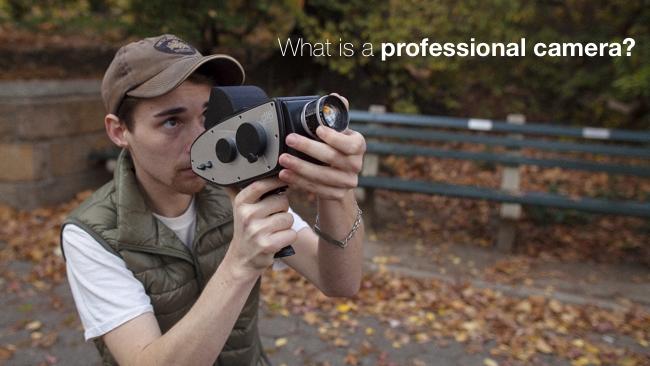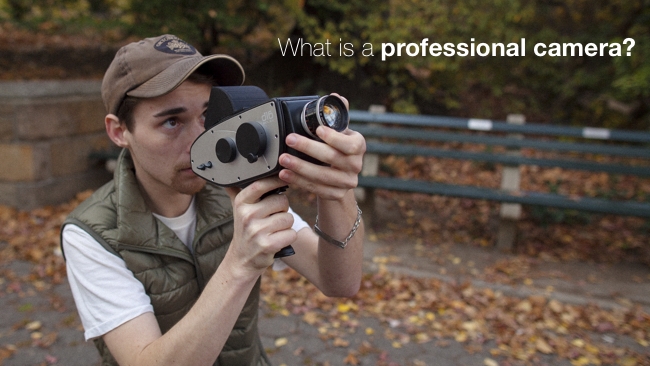
 What makes a professional camera?
What makes a professional camera?
What do we mean by "professional" camera equipment? Recent trends in cameras mean that it's getting harder to define them as professional or not
It's getting harder to define "professional". The last few years have seen such a dramatic leap in the price:performance ratio that most previous definitions of "professional" have been completely blown away by the new achievements in technology and manufacturing.
Is this good news? Mostly. It is if you need to buy equipment to do a "professional" job on a limited budget. It isn't if you still define a "professional" as someone who has spent a lot of money on their kit (and you’ve just spent a lot of money on your kit!).
There are some extraordinary examples of how even mainstream consumer electronics is performing as well as professional equipment, which we'll look at in a minute, but first, let's have a close look at how we might define something as "professional".
I think there are three characteristics that you need all or at least some of to call a camera product professional. These are: image quality, robustness and ergonomics. You don't need all of these to make a professional product. If a device is outstanding in one of these, it could make the grade as a pro device. If it has all of them, then there's no argument at all.
But where do you start? Because these days, even a telephone can take great pictures.
You might argue that if you're a photographer, you should expect to always take a decent camera with you. But that's not always going to happen. Photographers are just people, and they, like everyone else, will find that there are times when it's not appropriate or even possible to take a big, high quality camera. But - again like most people - they will almost always have their phone.
I've been astonished by the pictures and videos I'm getting with my iPhone Six Plus. I readily admit that I don't know how it's done. When you look on the back of the phone, there's just a very small fixed lens and - presumably - an absolutely tiny sensor. And yet the pictures are so good that I routinely go away on trips without taking another camera, and I'm not disappointed with the results. You probably wouldn't take an iPhone on a magazine cover shoot, but it absolutely fits the bill for a decent camera you can take with you at all times.
I've even been experimenting with recording podcasts with the iPhone. Properly lit, and with decent sound (using this Sennheiser microphone with a built-in mic pre-amp and Lightning connector) it looks absolutely fine on YouTube.
So, the question is: how much more would you have to spend to get something significantly better?
Well, if you have your phone on a contract, it's easy to forget that it would cost you around £600/$900 if you had to buy it outright. For that money, there are some very decent cameras that can take much better pictures. But you can't use those cameras to browse the internet, check your bank balance, or as a sat-nav. You always need your phone so the reality is that in a sense the camera in your phone is free. So you'd have to pay around £600/$900 to buy something significantly better. For just a little more you can get a camera that takes very good stills and HD or even 4K video.
Cameras around this price have improved so much recently that it's almost hard to take in the changes that have happened.
Just a few years ago (say, six or seven) you could buy an HD camcorder for well under £1000/$1,500, but the quality wouldn't be great. You'd have to use a format like HDV, or some other highly compressed codec. The lenses weren't great but - here's the biggest problem - the camera sensors were tiny. The bottom line was that the pictures weren't very good. They certainly weren't "professional" in any sense. While you could argue that these camcorders made sharper pictures than SD, they still didn't look very good, with washed-out colours and an overall muddiness that made them completely unsuitable for professional use.
Fast forward to today, and you can buy a camera like the Sony RX10 (mark I or mark II) with a superbly sharp Zeiss lens and a 20 megapixel 1 inch sensor that takes very good pictures and extremely usable video that you can absolutely use in a professional context.
Is this a professional camera? Possibly not, but it's one that professionals could take with them in the knowledge that they've always got a small, portable device with a good lens that can take very usable pictures. I would certainly always have one of these (or a similar Panasonic camera) with me as a spare or a backup.
Dedicated video cameras have changed almost beyond recognition too. The Blackmagic Pocket Cinema Camera makes extraordinary video for its price and is absolutely usable in professional productions. Video cameras in the range from £2,000/$3000 to £4,000/$6,000 are capable of cinematic quality with the right lenses.
And yet there's still a healthy market for video cameras that cost ten times that.
Perhaps this is where the more traditional definition of "professional" still applies. It's an area where cost is not a primary factor in the design of the camera. Where ergonomics is paramount: the sense that the design has to work on a film set, where the cost of even an expensive camera is small compared to even the daily cost of the film shoot.
So everything has to work properly, first time and every time. And it goes without saying that the pictures have to be superlative.
We are living in a bountiful age, where we can take great pictures and make wonderful films for astonishingly little money.
The way we define "professional" equipment has certainly changed radically over the last few years. But remember this: a professional photographer can usually take better pictures with any equipment, whether it's a top-end "professional" camera, or an iPhone. That, at least, hasn't changed, and it's not likely to.
Tags: Production


Comments